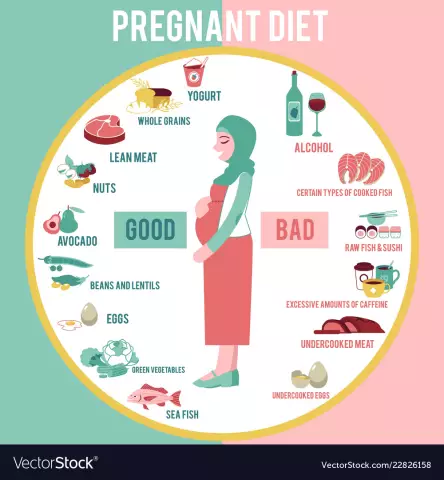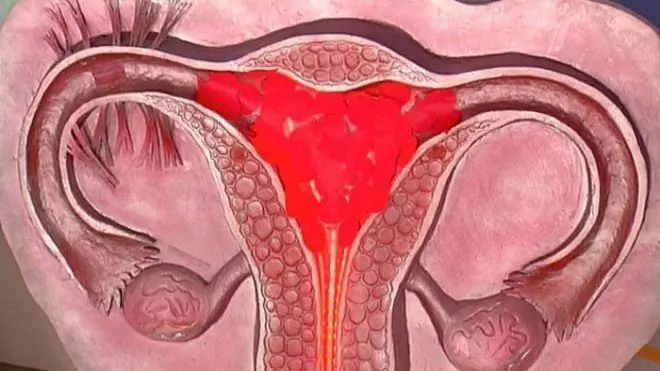- Author Rachel Wainwright wainwright@abchealthonline.com.
- Public 2023-12-15 07:39.
- Last modified 2025-11-02 20:14.
Diet after childbirth

It just so happens that most women find themselves overweight after giving birth. It may not be so significant - from six to eight kilograms, or it can be very noticeable - from ten kilograms. To regain your former shape, you will need to work hard. Those who think that weight itself will return to normal over time are very mistaken. Of course, those women who tried to keep track of their weight during pregnancy will find it easier to regain their former shape, but you still need to try. Several measures should be taken in the first months after childbirth.
In the period immediately after childbirth, the female body undergoes some stress - both from the birth itself and from hormonal changes that occur in the female body. During this period, it is not advisable to resort to any diets, but you still need to monitor the mother's diet after childbirth. What can be done in order not to get even more fat after childbirth and not harm the baby?
The basic rules of nutrition for mothers after childbirth in the first two to three months:
- Immediately after childbirth, a woman spends much more energy than before childbirth, therefore, she should consume about 500-600 more calories per day, but not more than 3000 calories per day;
- Nutrition should be balanced so that the baby has enough vitamins, trace elements and essential nutrients.
Every day, a nursing woman should consume:
- at least 500 milliliters of milk, kefir or yogurt;
- from 50 to 100 grams of cottage cheese or products from it;
- about 200 grams of meat;
- from 600 to 800 grams of vegetables;
- 50 grams of eggs and butter;
- at least 300-500 grams of fruit;
- from 400 to 500 grams of bread;
- 20-30 grams of vegetable oil;
In the mother's diet after childbirth, the use of too high-calorie foods should be limited: sour cream, cream, mayonnaise, fatty meat, duck and goose meat, nuts, sugar, sweets, cookies, rice and potatoes.
Care should also be taken to eat foods that can cause allergies in the baby: citrus fruits, honey, strawberries, chocolate, fish, coffee, pickles, strong meat broth, canned foods, sausages. All drinks containing alcohol, including beer, are categorically contraindicated.
- Food should be taken at least four to six times a day. Such a regime is useful both from the standpoint of the concept of proper nutrition and for lactation. Avoid indiscriminate snacking, eating at night, or gorging at night.
- Drink plenty of water - at least two liters a day. Only those with increased lactation can drink less.
- Try to give yourself physical activity, but do not overload. Moderate housework, walking, and stretching are helpful, and exercising on machines is contraindicated.
- Alternate sleep and rest correctly. Sleep in order to normalize weight should be at least 8-9 hours.

Already after three months after giving birth, you can resort to diets after childbirth, but not strict.
Postpartum diet menu
This diet after childbirth can only be followed by non-lactating women.
Breakfast: one hundred grams of bread with a thin layer of butter, grapefruit, a slice of low-fat ham.
Lunch: two hundred grams of boiled chicken fillet, cut into strips and mixed with 50 grams of fried almonds in butter. Season everything with pepper and salt, pour with lemon juice and add parsley, mix. Spread the salad on lettuce leaves and pour over soy sauce. You can use two hundred grams of any vegetables as a side dish.
Dinner: two hundred grams of boiled or stewed fish, boiled asparagus beans (150 grams) warmed up in one tablespoon of vegetable oil mixed with two chopped garlic cloves and chopped cilantro, one glass of tomato juice.
In between meals, drink kefir, juices, pure water or green tea.
Reviews: how to lose weight after childbirth
Many women who gained extra weight after childbirth were convinced that, thanks to strict adherence to the diet after childbirth and the elimination of fatty foods from the diet, they can return to their former shape in a fairly short time.
Found a mistake in the text? Select it and press Ctrl + Enter.






